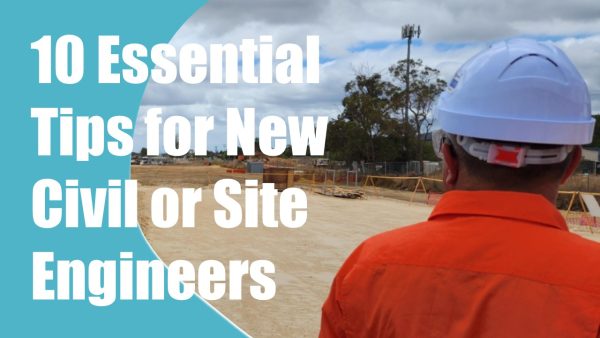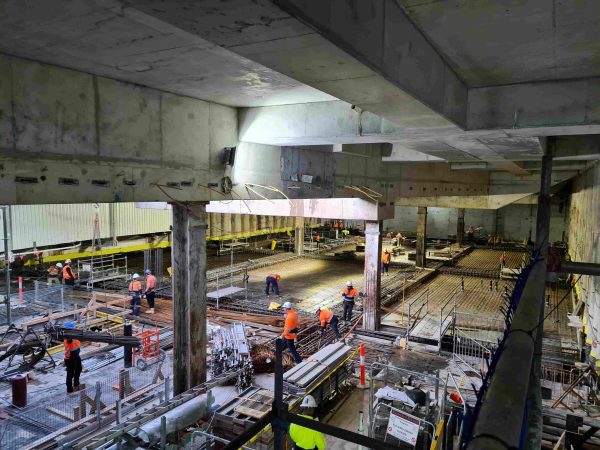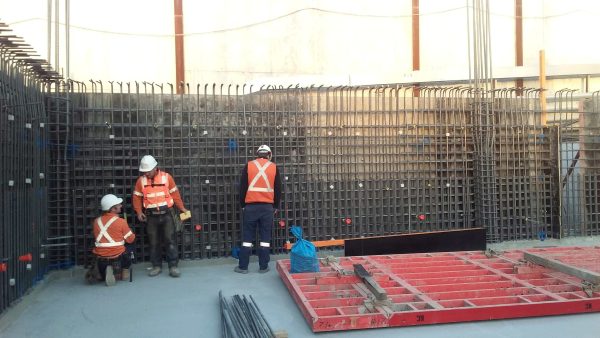Introduction
In this article, we shall discuss ten essential tips or key takeaways that I have learned since starting my career. A list of what has worked for me and other professionals. Once we get into the list, you’ll realise it’s not just specific to engineering or construction!
Rule #1: Keep Asking Questions
Never be afraid to ask a question; most time, people, especially those who love their work, are more than happy to answer. Of course, you may get the odd smart remark, but in all my time on site, this has happened a handful of times.
People will respect you more for valuing their knowledge rather than rushing into something and not fully understanding it. You’ll get the added benefit of learning something new every day.
Rule #2: Leverage the Knowledge of an Experienced Team
Walk into any organization or project on your first day, and you’re immediately surrounded by people of all experience levels and backgrounds. Feeding from rule #1, use this to your advantage. Supervisors, specialised contractors, tradespeople, plant & equipment operators, managers, and workers alike can all offer you years of experience and explanations of how to conduct complex tasks.
Don’t ignore this fact. Build rapport, show genuine interest, and you’ll soon understand techniques, methods, and, better yet, the specifications you read will all start to make practical sense.
Rule #3: Keep Records and Journal your Days.
Something I truly wish I had started earlier. There a two main reasons to journal – reflection and recall.
One of the best ways to learn about yourself and where your soft skills may need improvement is by reflecting on the outcomes of your daily interactions with people. Journalling will allow you to look back on what did or didn’t work and assist you in identifying what communication techniques to continue with certain team members or situations.
Over the last 13 years, I have worked on 10 separate projects in 2 countries and 4 major cities. Sectors, techniques, and challenges varied from project to project. What I have noticed in the latter years is that I am often looking back on the early days to find solutions for current projects. Having a detailed journal covering productivity, times, techniques, contacts and what worked would be of huge benefit now. Although my memory allows me to recall how we did something, having the finer details in a journal would now be invaluable.
Rule #4: Make use of Downtime.
We’ve all lived through the chaotic stage of a project when there aren’t enough hours in the day. Paperwork and administrative work go to the wayside and you’re scrambling to keep the job running.
But there are also times when things are quiet, this could be as when a project winds down or in between two projects. Don’t let your time fade away and end up with nothing to show for it. Here are three productive ideas to fill the time.
- Lessons Learned Report – Write a LLR to capture the positive and negative outcomes of the project you have just completed. Offer to present it to peers or colleagues. Many companies now hold “Lunch & Learn” sessions, which would be perfect for this, and it’s an opportunity to improve your public speaking and network with new people in your company.
- Continued Professional Development – Check out your company’s learning portals to see if any courses will benefit your career.
- Chartership – Review the requirements to become a Chartered Engineer in the country you work in. Companies will often encourage participation by covering yearly subscriptions. There may even be Chartered Engineers within your team who would be more than willing to help you get started.
Rule #5: Spend Time in the Right Places
Rule 5 is again related to rule 1 & 2. At the outset of your career, you’ll learn far more out on site or in the field than you will in the office. As your career progresses (and depending on the path you take), the time you spend on site will decrease. Be present on site when key activities are occurring and be inquisitive. Some activities may require you to stay on site and observe the entirety of the procedure, and I would recommend this. There are too many examples to list, but bored piling, installation of precast, installation of pavement or drainage are a handful.
Rule #6: Understand the needs of the wider Team.
In civil engineering and construction, we are often part of a smaller team that makes up the project team. Understanding and appreciating the needs of other interfacing teams and individuals is crucial for your success. It’s often something we ignore while we are busy pursuing our scope. Giving the correct notice to the community team that we are planning night works, or a road closure allows them adequate time to notify the community.
There’s also a reason your manager asks you to present a report a certain way. It’s because they are getting multiple reports weekly, and it helps them to read the report more efficiently. At first, this may seem trivial, but it saves them time during their day.
When we take the time to appreciate what our team members need, it leaves a good impression and encourages them to help when the circumstances are reversed.
Rule #7: Understand Career Routes & Paths for Progression
As mentioned above, you should spend the early stage of your career learning as much as possible rather than striving to climb a ladder. Although a balance is required and it’s always good to understand the routes and potential paths for progression.
If you don’t already have it, ask your manager for the organisational chart. Most companies will also have information on the various engineering streams within the organisation. You don’t need to know whether you want to go down a commercial, technical, or project delivery route, but understanding the routes will help. Speaking to people in specific roles within the organisation can also give you clarity on which stream you may go down.
Rule #8: Tool up for Success
Having a few basic items will set you up for success from day 1!
- A decent 8m tape measure (and don’t forget it when you head out on site)!
- An upgrade to the above would be a digital laser measure, but it’s not essential.
- A decent notebook that will fit in your pocket for record keeping (or use your phone).
- A lanyard for the various cards you will need.
- Sunblock – most sites will provide but have your own if you prefer.
Rule #9: Keep Comfortable
As the saying goes, get a good pair of shoes and a good bed, as if you’re not in one, you’re in the other! Companies must supply their workers with appropriate PPE. Although it’s fine most of the time, it may be worth investing in your own boots, socks, and trousers. This is especially important if you work in a very wet, cold, or hot environment.
Rule #10: Enjoy it!
Make sure to enjoy what you do and don’t get bogged down by pressure. Of course, strive to do your best, but understand that the job does get done, and worrying about it won’t solve the issue.
I often found myself restless at night or anxious at weekends when my mind was preoccupied with an issue on site. It took away from my rest and affected my presence at home. A technique I use to counter this is to spend 5 minutes writing down the best course of action I would take the next morning. This allows me to log the issue and move on knowing I have a plan in place.
Why not read our article on the role of the Site Engineer.



